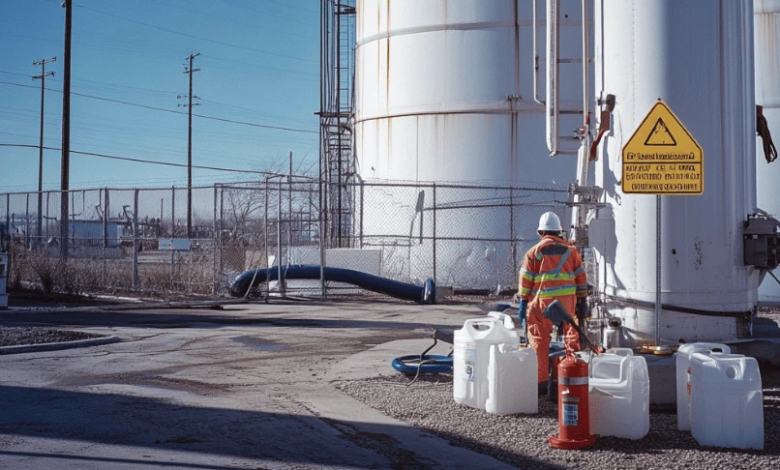The Essential Role of Industrial Tank Cleaning in Modern Facilities

Industrial facilities depend on storage tanks for water, oil, chemicals, and other critical materials. Over time, these tanks accumulate sludge, debris, and residues that reduce efficiency and create risks. Ignoring the problem can lead to contamination, equipment failures, and even safety hazards.
That’s why industrial tank cleaning is an essential practice. It’s not just about maintenance it’s about ensuring smooth operations, protecting workers, and meeting regulatory standards.
The Impact of Neglecting Tanks
When tanks aren’t cleaned regularly, problems escalate quickly. Sediment buildup reduces capacity, slows processes, and clogs connected systems. In industries that rely on precise operations such as energy, food production, or pharmaceuticals contamination can shut down entire lines.
The consequences of neglect include:
- Increased wear on equipment.
- Reduced storage efficiency.
- Higher risk of leaks or corrosion.
- Potential fines for regulatory noncompliance.
Regular cleaning prevents these issues, keeping facilities running at peak performance.
A Safety Priority
Tank cleaning isn’t just a matter of efficiency it’s about safety. Residues inside tanks can be flammable, toxic, or corrosive. Without proper cleaning, these substances pose risks to both employees and the environment.
By scheduling routine cleanings, companies create safer workplaces and reduce the likelihood of accidents. Workers can perform their jobs confidently, knowing the equipment they rely on is secure and well-maintained.
Meeting Compliance Standards
Industries are subject to strict environmental and safety regulations. Storage tanks, in particular, fall under close scrutiny because of the risks they pose if not properly maintained.
Regular cleaning helps companies stay compliant by:
- Ensuring tanks meet inspection requirements.
- Reducing the chance of leaks that contaminate soil or water.
- Documenting maintenance schedules for regulators.
Compliance not only avoids fines but also strengthens a company’s reputation as a responsible operator.
How Tank Cleaning Works
Professional industrial tank cleaning involves several steps designed to ensure thorough and safe results:
- Preparation – Tanks are drained, isolated, and ventilated.
- Inspection – Specialists examine the tank’s condition to identify issues.
- Cleaning – Sludge, sediment, and residues are removed using specialized equipment.
- Disposal – Waste is handled according to environmental regulations.
- Final check – The tank is tested and certified ready for use.
This process requires training, protective gear, and advanced technology, which is why companies rely on specialized cleaning teams.
Advanced Cleaning Methods
Modern facilities benefit from innovations in cleaning techniques. High-pressure water jets, chemical treatments, and even robotic systems are now used to reduce downtime and improve safety. These methods allow cleaning to be more precise, less invasive, and environmentally responsible.
Robotic systems, for example, reduce the need for workers to enter confined spaces, lowering risks while still achieving thorough cleaning.
Environmental Responsibility
Industrial tank cleaning also supports sustainability. Removing sludge and waste properly prevents harmful substances from entering the environment. Many cleaning services also recycle or safely dispose of materials, reducing the ecological footprint of industrial operations.
In today’s business climate, where sustainability is increasingly valued, this responsibility matters not only for compliance but also for brand reputation.
The Benefits of Routine Cleaning
Facilities that schedule regular tank cleaning enjoy multiple advantages:
- Operational efficiency – Clean tanks store and transfer materials more effectively.
- Cost savings – Preventing breakdowns reduces repair and replacement costs.
- Longevity – Clean tanks last longer, protecting infrastructure investments.
- Reputation – Meeting safety and environmental standards boosts trust.
Routine cleaning isn’t just about solving immediate problems it’s about long-term success.
The Role of Professionals
While some maintenance tasks can be done in-house, tank cleaning is not one of them. It requires expertise, safety training, and specialized equipment. Professional services ensure the job is done thoroughly, safely, and in compliance with regulations.
For companies, hiring experienced professionals means peace of mind, knowing their tanks are being maintained to the highest standard.
Planning for the Future
Industrial facilities that view tank cleaning as a strategic practice, rather than a reactive one, stay ahead of challenges. By integrating cleaning into long-term maintenance plans, companies protect productivity, reduce risks, and save money over time.
Key Takeaways
Industrial tank cleaning is more than routine maintenance it’s an essential practice that safeguards operations, workers, and the environment.
Homeowners maintain heating systems for peace of mind; industrial facilities maintain tanks for the same reason security, reliability, and efficiency. By prioritizing professional industrial tank cleaning, companies ensure their operations run smoothly, their equipment lasts longer, and their reputations remain strong.



